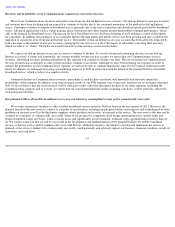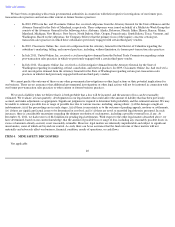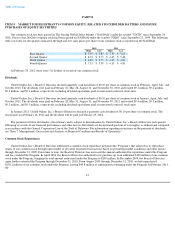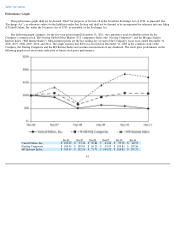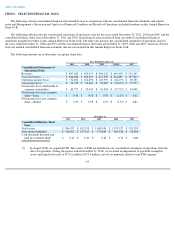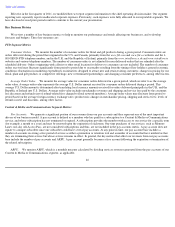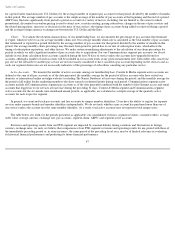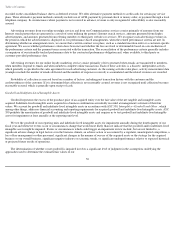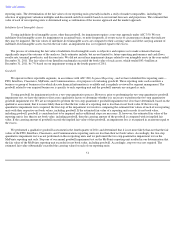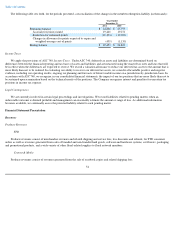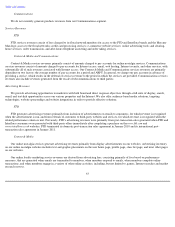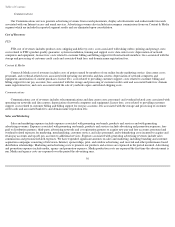FTD.com 2011 Annual Report Download - page 49
Download and view the complete annual report
Please find page 49 of the 2011 FTD.com annual report below. You can navigate through the pages in the report by either clicking on the pages listed below, or by using the keyword search tool below to find specific information within the annual report.
Table of Contents
for a period (after translation into U.S. Dollars) by the average number of segment pay accounts for that period, divided by the number of months
in that period. The average number of pay accounts is the simple average of the number of pay accounts at the beginning and the end of a period.
ARPU may fluctuate significantly from period to period as a result of a variety of factors, including, but not limited to, the extent to which
promotional, discounted or retention pricing is used to attract new, or retain existing, paying subscribers; changes in the mix of pay services and
the related pricing plans; increases or decreases in the price of our services; the timing of pay accounts being added or removed during a period;
and the average foreign currency exchange rate between the U.S. Dollar and the Euro.
Churn. To evaluate the retention characteristics of our membership base, we also monitor the percentage of pay accounts that terminate
or expire, which we refer to as our average monthly churn rate. Our average monthly churn rate is calculated as the total number of pay accounts
that terminated or expired in a period divided by the average number of pay accounts for that period, divided by the number of months in that
period. Our average monthly churn percentage may fluctuate from period to period due to our mix of subscription terms, which affects the
timing of subscription expirations, and other factors. We make certain normalizing adjustments to the calculation of our churn percentage for
periods in which we add a significant number of pay accounts due to acquisitions. For our Communications segment pay accounts, we do not
include in our churn calculation those accounts canceled during the first 30 days of service unless the accounts have upgraded from free
accounts, although a number of such accounts will be included in our account totals at any given measurement date. Subscribers who cancel one
pay service but subscribe to another pay service are not necessarily considered to have canceled a pay account depending on the services and, as
such, our segment churn rates are not necessarily indicative of the percentage of subscribers canceling any particular service.
Active Accounts. We monitor the number of active accounts among our membership base. Content & Media segment active accounts are
defined as the sum of all pay accounts as of the date presented; the monthly average for the period of all free accounts who have visited our
domestic or international online nostalgia websites (excluding The Names Database) at least once during the period; and the monthly average for
the period of all online loyalty marketing members who have earned or redeemed points during such period. Communications segment active
accounts include all Communications segment pay accounts as of the date presented combined with the number of free Internet access and email
accounts that logged on to our services at least once during the preceding 31 days. Content & Media segment and Communications segment
active accounts for the six-month, nine-month and annual periods, as applicable, are calculated as a simple average of the quarterly active
accounts for each respective segment.
In general, we count and track pay accounts and free accounts by unique member identifiers. Users have the ability to register for separate
services under separate brands and member identifiers independently. We do not track whether a pay account has purchased more than one of
our services unless the account uses the same member identifier. As a result, total active accounts may not represent total unique users.
The table below sets forth, for the periods presented, as applicable, our consolidated revenues, segment revenues, consumer orders, average
order value, average currency exchange rate, pay accounts, segment churn, ARPU, and segment active accounts.
Revenues and operating results from our FTD segment are impacted by seasonal holiday timing variations and fluctuations in foreign
currency exchange rates. As such, we believe that comparisons of our FTD segment's revenues and operating results for any period with those of
the immediately preceding period or, in some instances, the same period of the preceding fiscal year, may be of limited relevance in evaluating
its historical financial performance and predicting its future financial performance.
47


